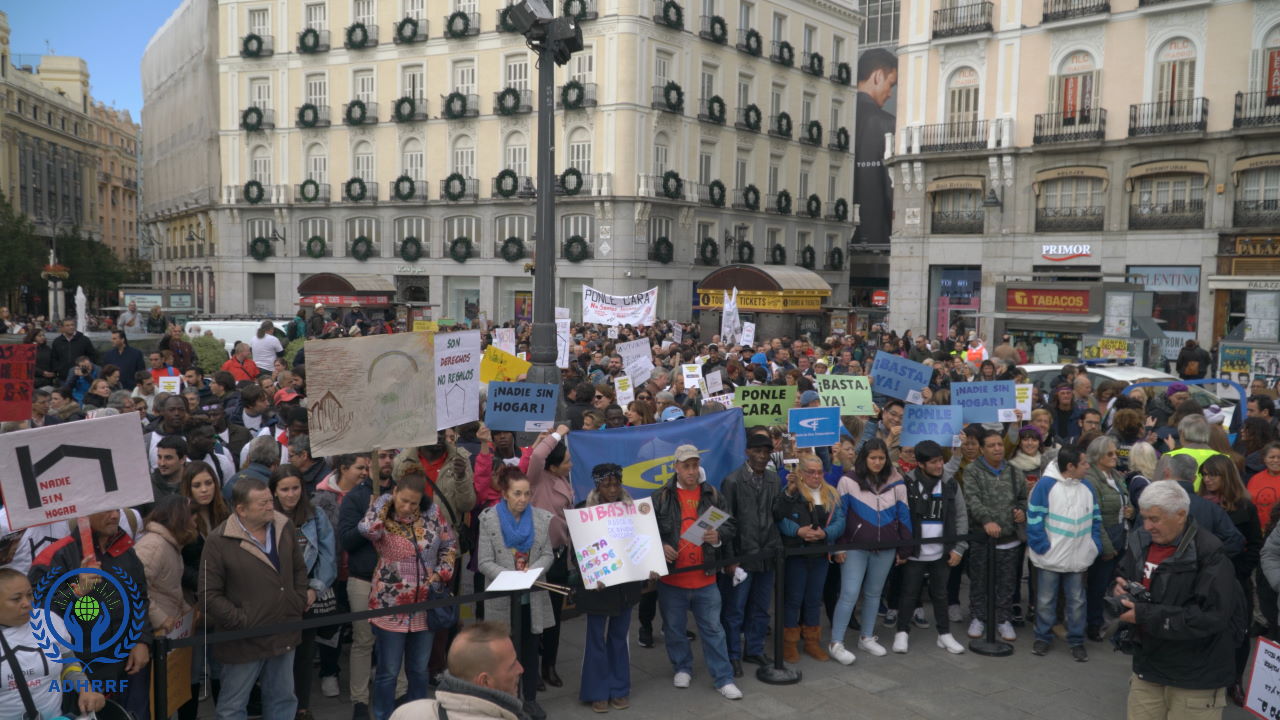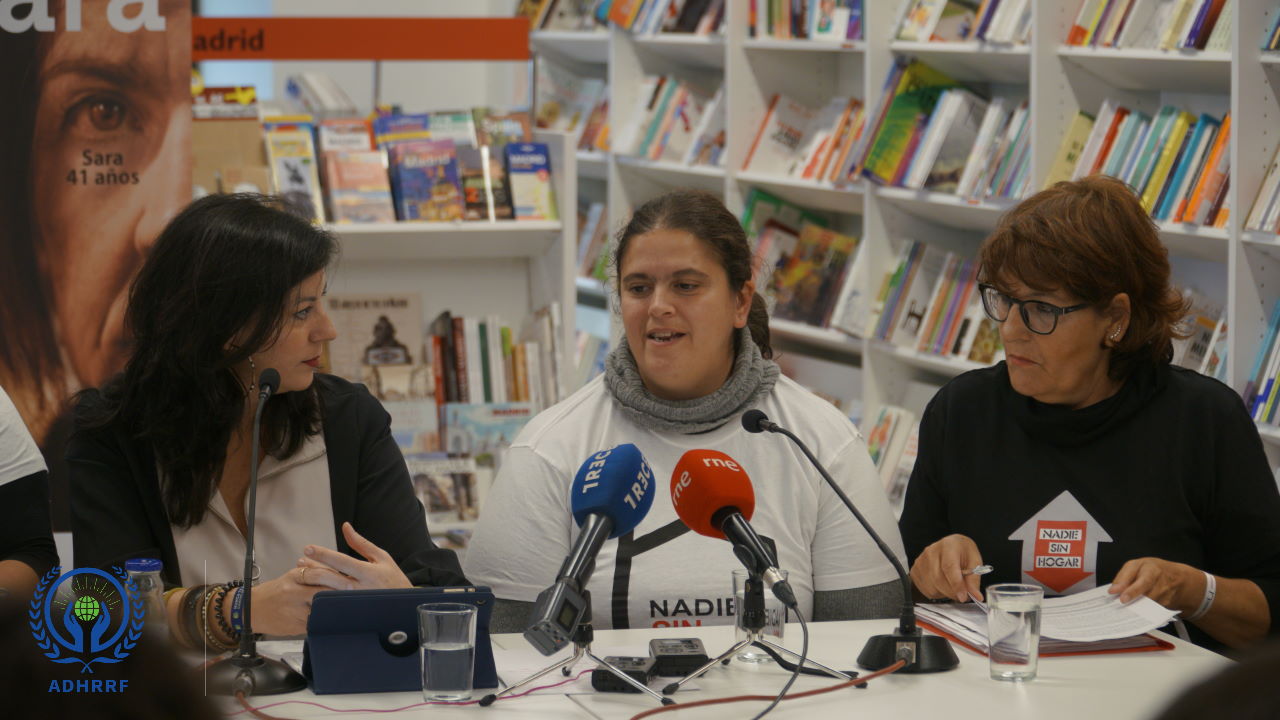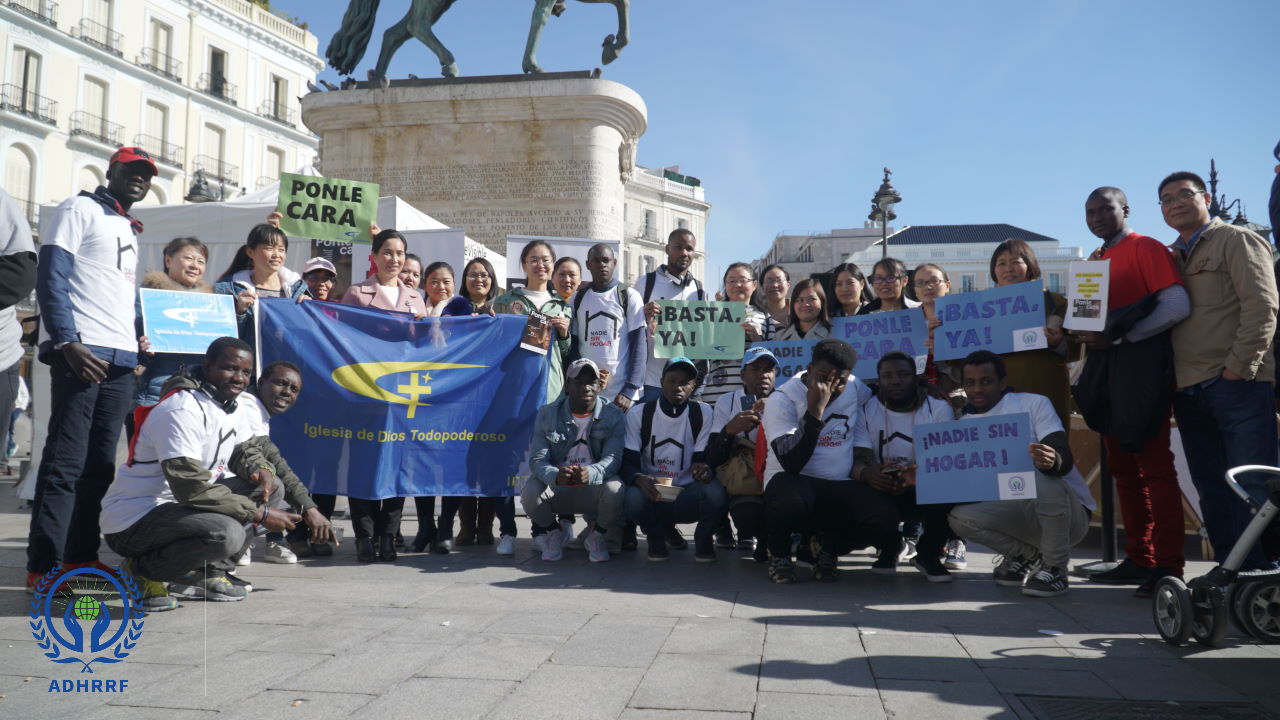ADHRRF — On October 24, the 27th “Homeless People’s Day” was held in Madrid, Spain. The event paid special attention to women living on the street.

With a gradual decline in temperature, Europe is about to usher in the cold winter months, but there are still many homeless people wandering the streets. A survey shows that about 40,000 people in Spain are homeless, among whom about 15-16% are women. Madrid alone has 3,000 homeless people and at least 700 to 800 sleep on the streets.
On October 24, the Homeless Day, Cáritas Madrid, along with several NGOs, held a press conference at the San Pablo Bookstore of Jacinto Benavente Square, urging the entire society to “put a face to the homeless” and confront the most bloody social reality. The event, unlike previous years, was especially concerned with women living on the street. Three homeless women told about their own experiences at the event.
Inma is Spanish, born in a family always in need of government assistance. When her parents died, she was left alone and suffered from depression. One day when she went home, she found the house had been occupied because she could not afford the rent. Since then, she became homeless and wandered the streets, and sometimes took shelter in boarding houses. Now she lives in an apartment provided by Madrid City Hall, but this is only temporary. She is eager to have a fixed home.
Mina, who went to Spain from Morocco 19 years ago, said, “All I want is a job. I’ve lived on the street, I got insulted and nobody wanted to hire me. I’ve been working hard all my life and I really want to fight. I just want an opportunity to work.”

Ana Lucia had to leave her country due to the widespread violence in Guatemala. Unlike other homeless women, Anna had work experience and she had been waiting for a job offer. She said, “I’ve worked many years in international trade. Many people don’t understand that immigrants (we) just want to work and contribute to society. We have not come here to be a burden of the government.”
Anna arrived in Spain about a year ago. While waiting for her refugee status, she had to live in a temporary shelter apartment provided by Cáritas, making a living from taking care of the elderly, but the pay was not good. She said grudgingly, “When we have a job, our wages are not enough to pay the rent. We are charged 2 to 3 months of rent for a room. But for those who earn between 500 and 600 euros, how could they pay 500 euros for a single room?”
“About 18,000 people are using accommodation and maintenance services every day, with an increase of 10% compared to 2016; in that increase there are also female faces,” according to the head of the Homeless People Campaign in Cáritas Española, Enrique Domínguez. In the face of this phenomenon, Rosalía Portela, President of the Federation of Entities and Centers for the Integration and Help of Marginalized People (FACIAM), expressed her concern, “Although the majority of homeless people are not women, it is a growing reality. Don’t forget they are the ones who suffer the most from the street situation, most vulnerable to violence of any kind. In fact, more than half of homeless women have been through these sufferings.”
.jpg)
.jpg)
The event has been held for 27 consecutive years. Despite the undeniable achievements, it is just as the “Homeless” Declaration stated: “(The concern for the homeless) resembles a summer storm that, once passed, plunges us back into the invisibility we usually live in.”
In order to truly solve the accommodation problem of the homeless, Enrique Domínguez has cried out against “the socio-economic model that leaves people out.” In particular, the 40,000 people who are suffering from this scourge, whether living on the street, in shelters, or boarding houses, will not easily forget the pain of losing their home or their poor life in slums. He especially urged the three administrations (municipal, regional and central) to offer real answers, starting with promoting a social rental program that reaches many more people, because “Spain is one of the nations with the lowest social security coverage in all of Europe.”
After the conference, many people present joined the homeless walking in the rally from the Callao Square to the Puerta del Sol.
On that day, some Christians from The Church of Almighty God (CAG) attended the event. They called on the government and society to pay attention to the dignity and rights of the homeless people, with the hope that more people would care for and help the homeless. They also said that they would do voluntary work to help them in reality.
It was understood that about 30 cities jointly carried out the rally on the day of event. Thousands of people took to the streets and squares of Spain together, calling for people to put a face to the homeless and demanding that the government implement the social policy to defend the rights of the homeless.

The event was hosted by the Federation of Entities and Centers for the Integration and Help of Marginalized People (FACIAM), supported by Cáritas Madrid, Spanish Catholic Migration Commission (ACCEM), The Church of Almighty God (CAG), Association for the Defense of Human Rights and Religious Freedom (ADHRRF) and other organizations, and sponsored by the Madrid City Council and the Madrid Community.












